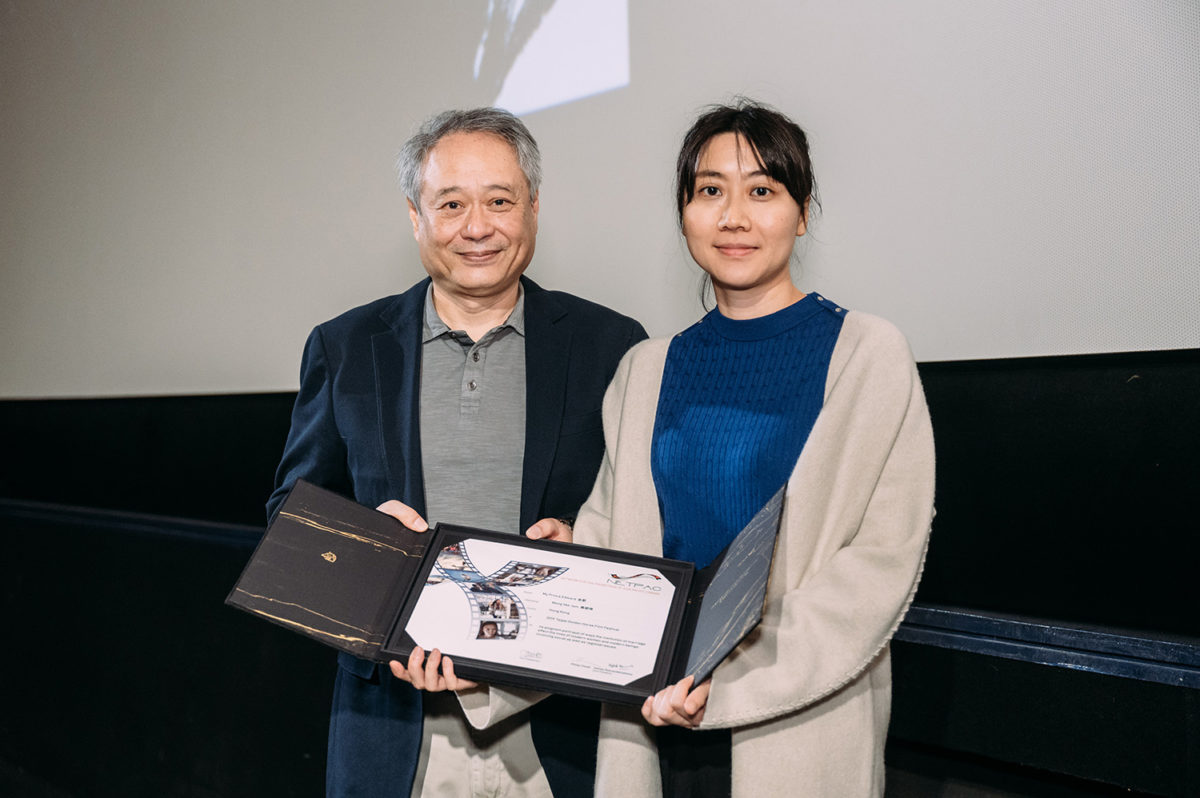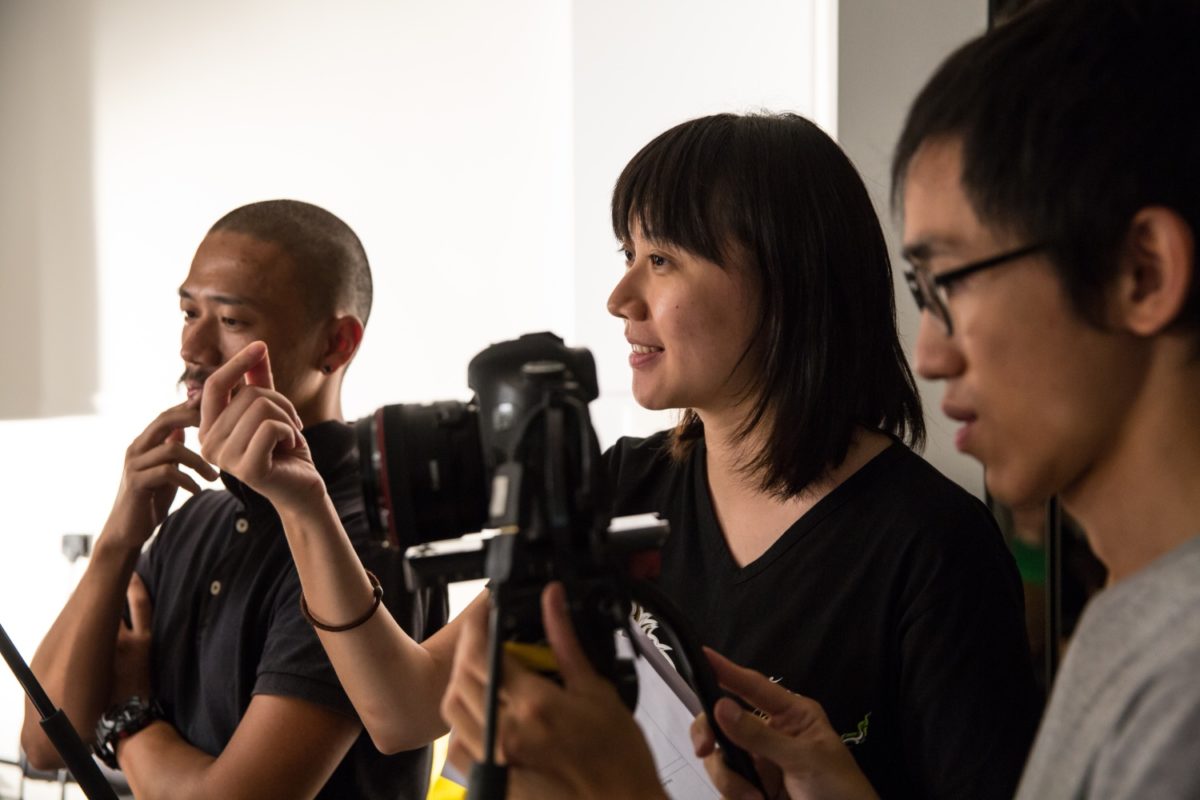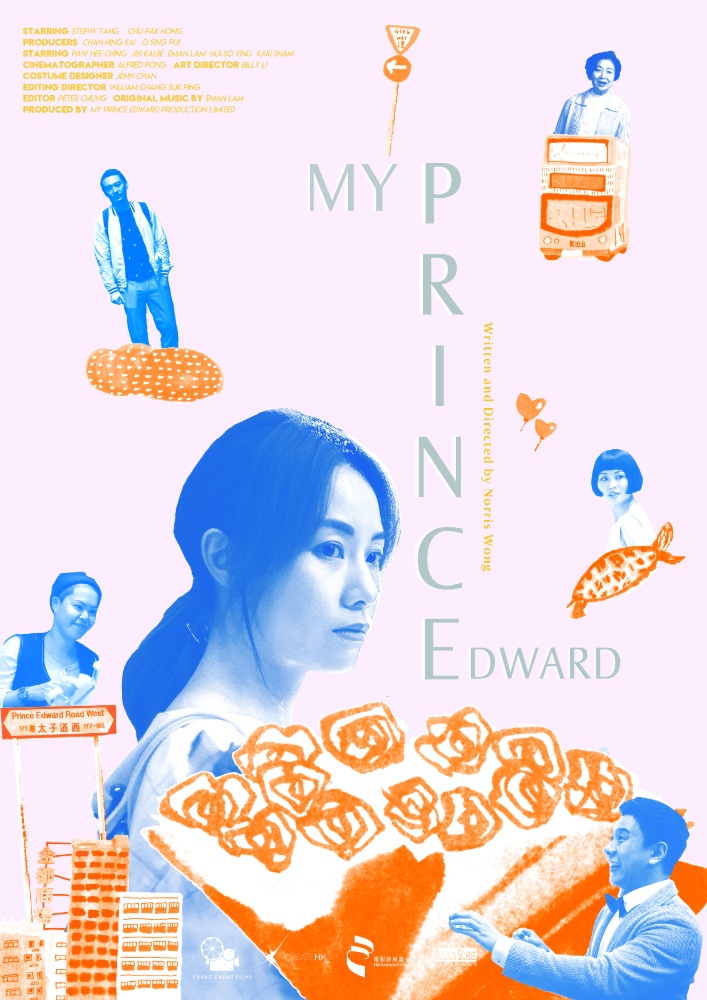Writer and director Norris Wong set her debut feature My Prince Edward in a crowded shopping district of Hong Kong, specifically the Golden Plaza mall. We’re introduced to Cheung Lei-fong (Stephy Tang) and her boyfriend Edward Yan (Chu Pak-hong), who work in a bridal shop but have yet to marry themselves. Fong is wondering whether to end the relationship when Edward suddenly proposes. That’s when Fong finds out she’s still technically in a sham marriage with Yang Shuwei (Jin Kaijie) from mainland China.
A mosaic of small, telling moments, My Prince Edward builds an intricate world of lost dreams and disappointments. Fong seems to drift passively through life, Edward has mommy issues, and Yang can’t commit to any of his plans. Yet Wong’s humor and sympathy for her characters make them people to care about.
Wong established herself as a novelist, songwriter, and screenwriter before receiving funding to make My Prince Edward from Hong Kong’s First Feature Film Initiative. The film’s release in Hong Kong fell prey to the coronavirus shutdown, but still won two awards at the recent Hong Kong Film Awards, one for Best New Director.
Ahead of the North American release by Cheng Cheng Films, we spoke with Wong through the Far East Film Festival in Udine, Italy. Thanks to Felix Tsang for translating.
The Film Stage: This is your debut feature, but you’ve also written novels and screenplays. Had you always wanted to direct?
Norris Wong: I studied film production when I was getting my masters degree at the Baptist University School of Filmmaking, where I wrote and directed my graduation project. However, I realized after I started working in the film industry that there weren’t many opportunities for new directors, so I started to focus on writing instead. I’ve managed to learn various filming techniques through working with different directors. But I actually feel more comfortable as a writer, and in the future I see myself focusing on writing. If something comes up in the future, like a script that is dear to my heart, if I feel the urge to direct, I will.
Fong and Edward seem to have a long-term relationship; they’ve worked out how to live in a tiny apartment without stepping on each other’s toes. You capture such deeply personal moments between them that the movie seems autobiographical.
I wrote the script in May 2017, based more on my influences than my family. My mom was very similar to Fong, quite reserved. My dad was quite similar to Edward––very much a man-child. He loved to crack jokes and didn’t take things too seriously. But Edward’s character is actually an amalgamation of my previous relationships, and I don’t believe that my family influenced my perception of marriage. I’m single, but my brother had a very “normal” path. He dated someone for ten years and then they married, very normal.
When I was studying script writing at Baptist University, I was the only student from Hong Kong. All the others were from mainland China. I based Yang on one of my classmates. He actually asked me if I would fake marry him so he could get permanent residency in Hong Kong.
Why does Fong stay with Edward?
Fong doesn’t really know what she wants. Her personality is such that she doesn’t usually have opinions. She usually compromises with what comes her way to avoid conflict. So when a boy approaches her, and he is not that bad of a deal, then she will basically just give him a try.
After all these years, there are definitely communication problems between Fong and Edward, but she would be the one who finds a way to sort of let things slide, find compromises for situations. On the surface it appears that their relationship is very stable, but then all these problems start coming up when the issue of marriage is upon them.

Norris Wong winning the NETPAC award at Taiwan Golden Horse Film Festival from executive committee chairman Ang Lee. Credit: Taipei Golden Horse Film Festival Executive Committee.
Much of the film takes place in the Golden Plaza shopping mall.
I had the idea of shooting there while I was writing the script because I lived right across the street from it and would see its orange and red neon lights every night. I would look across and think how intriguing the mall was, how many stories could be told there. It’s not only a shopping mall, it’s also a residential building. So that’s already kind of weird. But there are also these little offices, Chinese doctors, private investigators. And on the ground floor there’s a stop for a shuttle bus that goes to the mainland.
I grew up in the area, it’s called Prince Edward. I wanted to set the movie there, at the place where they sell fish, the parks, the bus stops at all those locations are where I grew up.
When Fong and Edward are in bed bathed in red light, that’s the actual color of the Golden Plaza neon lights. The color red is a color of celebration in Chinese culture. It’s used for marriage and Chinese New Year. But red is also a scary color because it’s moody, bloody. That conflict matches with the story as well. Is it a celebration or is it scary?
Right, there’s a lot of ambiguity in My Prince Edward. Viewers can’t even tell what the characters really want.
At first, my goal was for all of the audience members to want to get divorced. Of course that didn’t work out, the film didn’t work out that way. Now I think I want to encourage people to see what’s not working in Fong and Edward’s relationship. And I want women to see that marriage is not the only way. It doesn’t mean that you’re a failure if you don’t get married.
Stephy Tang is one of Hong Kong’s top actors. What was it like collaborating with her, developing Fong’s character?
I didn’t know Stephy before making this film, but I was very impressed by her since I saw her layered performance in Pang Ho-cheung’s Trivial Matters.
We received funding from the First Feature Film Initiative (FFFI), which is the primary program that helps first-time filmmakers. These are low-budget projects, but one real advantage is that they don’t influence your creative process, unlike a studio where they have creative control over the writer and director.
In order to apply, you need to submit a full script. These scripts are available for actors to read. Stephy, Ms. Tang, read the script, she liked it, so she didn’t mind the low budget. This is the second time that Stephy has participated in a FFFI project, after Somewhere Beyond the Mist.
Also we were both born in the 1980s, born and raised in Hong Kong, so our sentiments are very similar: our world view, our views on marriage, they’re synchronized. Everything sort of meshed after our first meeting. We fine-tuned small details in the dialogue, but in terms of the general gist of the script, Stephy was pretty cooperative.

Was it difficult to persuade Chu Pak-hong to play Edward? He’s a difficult character.
Chu didn’t have adverse reactions to the character because there is a balance of positive and negative traits to Edward’s personality. I tried to make the characters in my film as three-dimensional as possible; Fong has her faults as well.
When you are working with actors, do scenes change or evolve during rehearsals? Do you see the material differently?
We made slight changes to the script throughout the rehearsal process. For example, there were instances where an actor might walk and talk at the same time. Then after rehearsing on location, we would decide to take the dialogue out. Or when the characters were arguing, we might switch around some lines and modify some of the wording during rehearsal in order for the scene to flow better.
While we were shooting on location, there were instances where I had to add dialogue when I felt that a scene needed more richness and detail. One of the biggest changes we made was originally Yang met Fong on a foot bridge to let her know that he has given up pursuing his one-way permit. After filming it, we decided to re-shoot the whole scene in a shop that sells parallel imported goods to reinforce the character change within Yang.
Because of the budget, weren’t you under significant time pressure?
Before we started shooting, I was in constant communication with Chu. He even went to Golden Plaza with me to research, so we could cut down on preparation time. And Stephy Tang had a lot of experience from her previous films, she really understood the character, so all we had to do was some minor tweaking while we were on location.
You include several long, extended takes that must have been difficult to shoot.
Those long takes were a conscious choice, I wanted them to portray a sense of realism and immediacy, to bring viewers into the moment. I also wanted to highlight the mall, because although it’s an iconic place, it’s also rundown. It isn’t commonly shown in Hong Kong films. I wanted to document it. There’s actually another long take that follows Edward from the third floor down to the ground floor, but that scene didn’t make it into the final cut.
Given the political situation, how would you approach the script today?
The script was written in May of 2017. The Hong Kong mainland conflict was not as intense then. I’ve thought a lot about the topic of freedom recently. It’s something you don’t really think about until it’s being threatened. Something like, a fish doesn’t realize it’s swimming in water until there’s no water around it and then it starts gasping. This is sort of the mentality that’s sinking in recently.
I guess it would be very different to write the story now. The vibe in Hong Kong right now, it feels that the issues of marriage and romance are not very important, there are more important things that Hong Kong people are striving for. Because the film is in release in Hong Kong, I can tell that this subject matter is not something that people want right now. If I were to rewrite the script, it would be about something completely different.

How did the pandemic affect the film’s release?
Felix Tsang (Sales & Acquisitions Manager, Golden Scene): Our distribution plan in Hong Kong was ruined. Part of our original strategy was for the film to be released close to the Hong Kong Film Awards, which are usually held in April. This year there was no physical award ceremony, the whole program changed to an online presentation in May. And without a physical show, there’s not as much press coverage.
All of the cinemas were closed by the pandemic. When they started to reopen in late May, they were restricted to 50% capacity, with ticket prices very low to attract customers. We decided to release the film in mid-June, about three weeks ago. We have had good audience response, but the numbers are not as much as we originally hoped for.
Norris, do you have another film planned?
For my next film, what I wanted to write about was migration. Whether people will leave or stay, it’s something that’s being discussed in Hong Kong nowadays. It’s sort of related to the COVID situation as well, because right now people are not allowed to move or migrate. I feel that this type of struggle and dilemma very much reflects the current state of mind for a lot of Hong Kongers. We are confused and lost about the path ahead, and we don’t know where or what it means to settle down.
[Note: Spoilers follow.]
The ending of the filim is especially enigmatic.
From the very beginning of writing the script, I planned that Fong was going to leave Edward, leave the Golden Plaza, leave Prince Edward entirely, and start a new chapter in her life. But in screenings and Q&As over the past couple of months, it’s been interesting to see audience members feel that Fong will go back to Edward.
Maybe it’s because there’s a scene where she’s buying a kitchen table.
We did that whole scene in the furniture store after the principal shoot was over. The hand on the cell phone in that shot is actually mine, not Stephy Tang’s. I added the scene to show that Fong is finally doing something for herself, buying something that she wants.
My Prince Edward will be released in North America by Cheng Cheng Films. See our exclusive poster debut below.


